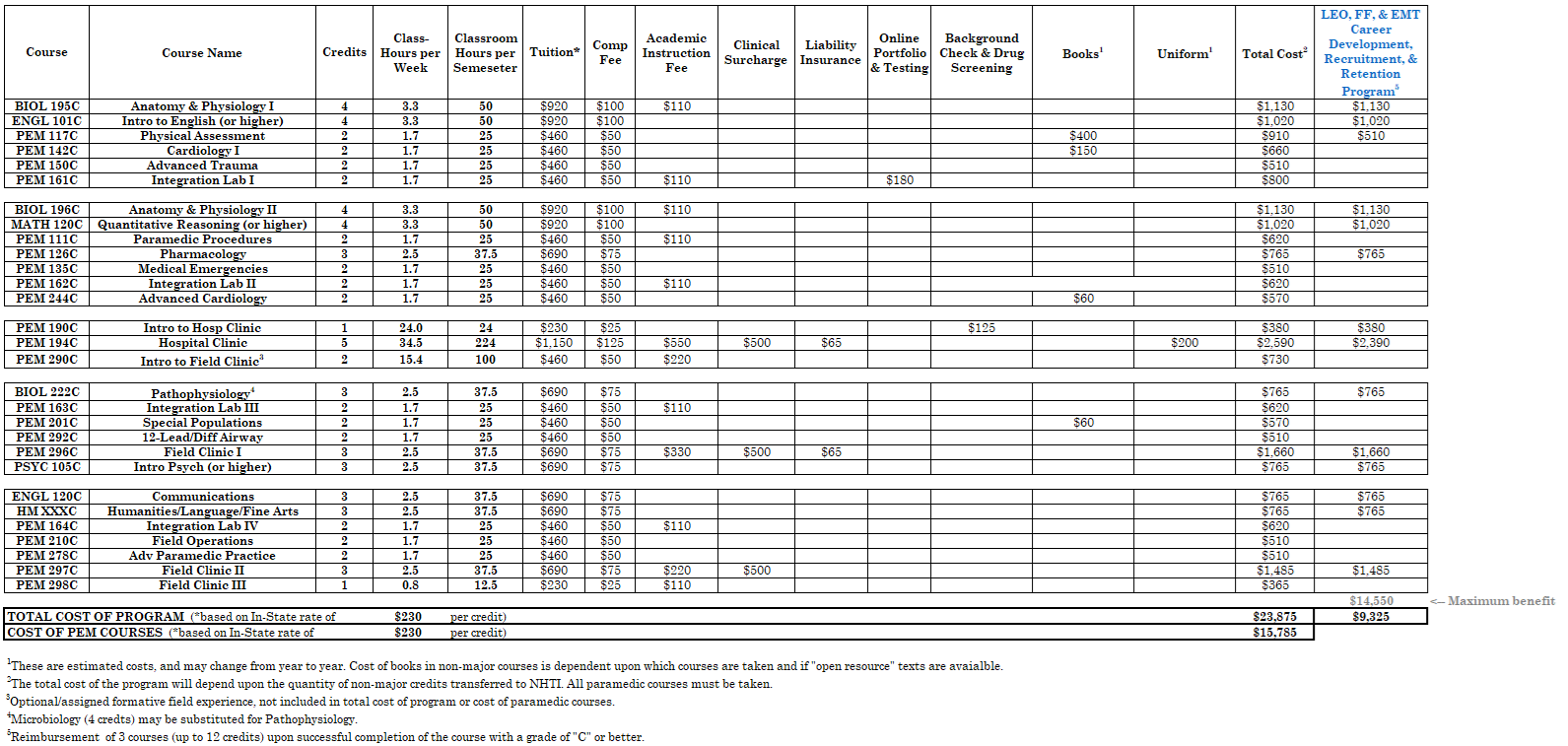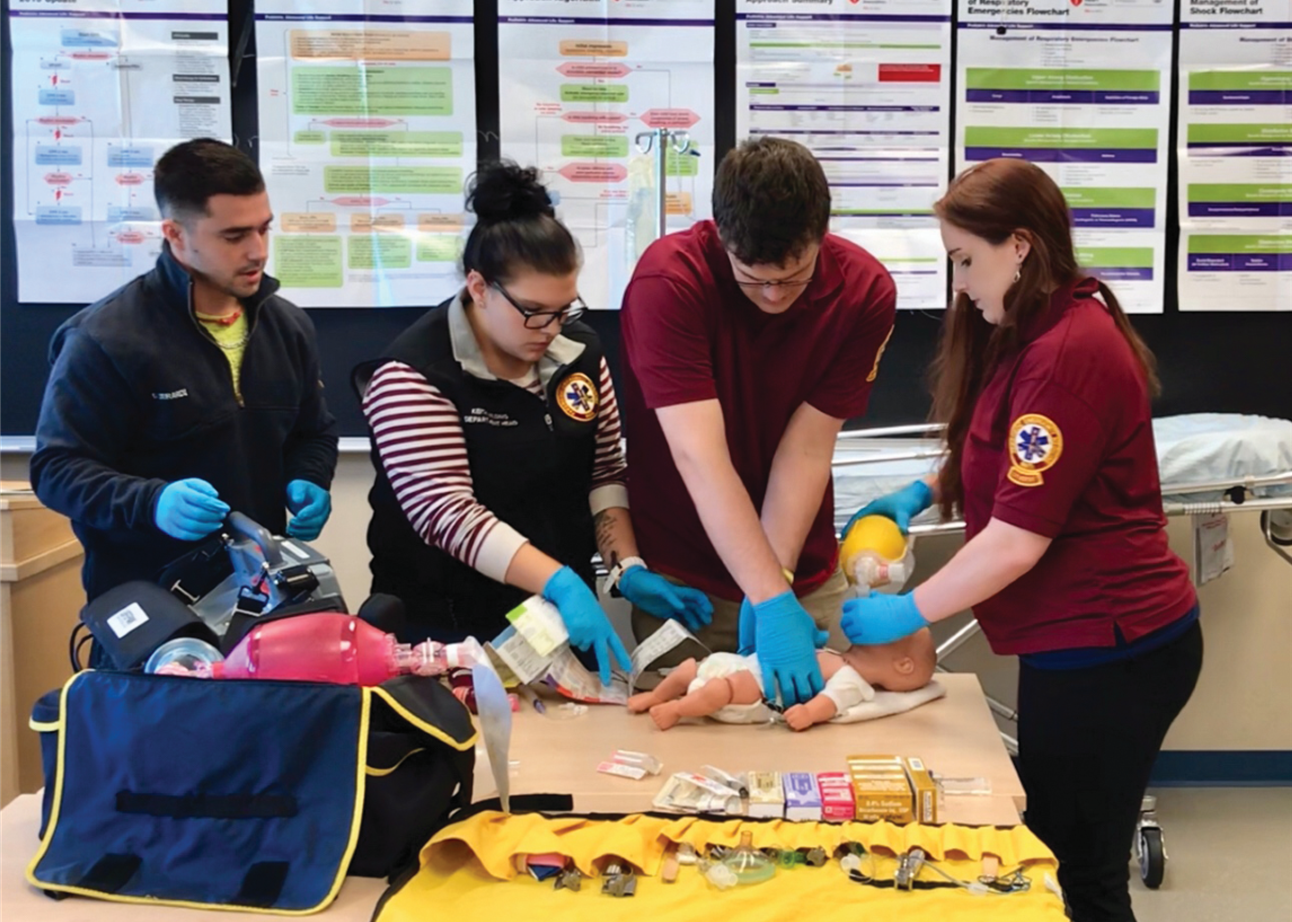NHTI’s Paramedic Emergency Medicine degree program is the only one of its kind in N.H. and has been educating paramedic students since 1977. The program has small classes taught by degreed-instructors, current equipment, and a full-sized ambulance simulator. It combines paramedic courses, general education requirements, specialty certifications, and diverse hospital and pre-hospital experiences. You'll have opportunities to work with some of New England’s finest hospital and prehospital affiliates. This degree program offers:
- Rigorous curriculum that exceeds the national standards
- Paired lectures and labs to allow for hands-on practice of the weekly topics
- Comprehensive courses in anatomy and physiology and pathophysiology
- In-depth cardiology education, which includes BLS, ACLS, and PALS certifications
- Progressive clinical track for hospital and field experience
- Updated Gaumard and Laerdal simulation mannequins (adult and pediatric)
- Physio-Control LIFEPAK 15 and iSimulateALSi monitors and Glide Scope Go video laryngoscopes
Upon successful completion of all freshmen courses and their hospital clinic, students may test for the AEMT; the NHTI program pass rate is 100%.
Do you have questions? Contact Keith Wilding, program coordinator, at kwilding@ccsnh.edu or 603-271-6484 x4213. The department chair for this program is Amy VonKadich, who can be reached at avonkadich@ccsnh.edu.
Apply for this program today on our Admissions page with step-by-step instructions and enrollment pathways build just for you!
Preference will be given to applicants whose applications are complete (with the exception of the interview) and received by the Admissions Office by the deadline.
Admissions Deadline: March 31, 2026 through July 31, 2026 on a space availability basis
Applicants are required to have:
- A valid driver’s license and be at least 18 years old
- High school (or college) courses in lab-based Biology and Chemistry, completed with minimum grades of “C” or college-level Anatomy & Physiology I and II with minimum grades of “C”
- High school (or college) Algebra I completed with a minimum grade of “C”
- Current National Registry or State EMT/AEMT certification
- Current BLS CPR certification from the American Heart Association, American Red Cross, or the National Safety Council. Online-only programs are not approved.
- Letter of recommendation from an EMS supervisor
- Documentation/verification at least 100 patient contacts and 25 team-leads while working as an ambulance-based EMT/AEMT; download the Field Experience Verification form.
- Interview with the Department Chair of Paramedic Emergency Medicine
Students who wish to enter this degree program and are enrolled in another NHTI program must complete and submit the Change of Program form and submit it to the Admissions office at NHTIadmissions@ccsnh.edu.
Those considering paramedic education should take the associate degree. For many, it provides competitive entry into the job market, a stronger advantage for career advancement, and the potential for academic advancement with the ability to transfer course credits to a four-year college. Our graduates have a 100% pass rate for NREMT written and practical exams as well as 100% job placement after graduation.
Clinical rotations include high-volume, fire-based, hospital-based, and private ambulance services. Students who complete this program can enter into the following professions (not an inclusive list):
- Ambulance-based paramedicine (private, public, and/or volunteer services)
- Hospital-based paramedicine (typically in the emergency department setting) and urgent care facilities
- Mobile integrated healthcare/community paramedicine
- Cruise ships, oil rigs, entertainment venues (sports, movie/TV sets, concerts)
First Year
Fall Semester
Spring Semester
Summer Semester
Second Year
Fall Semester
Spring Semester
Accreditation
The NHTI Paramedic Emergency Medical Program is accredited by the Commission on Accreditation of Allied Health Education Programs (www.caahep.org) upon the recommendation of the Committee on Accreditation of Educational Programs for the Emergency Medical Services Professions (CoAEMSP). Most recent accreditation was March 15, 2024.
Commission on Accreditation of Allied Health Education Programs (CAAHEP)
1361 Park Street
Clearwater, FL 33756
727-210-2350
www.caahep.org
Committee on Accreditation of Educational Programs for the EMS Professions (CoAEMSP):
8301 Lakeview Parkway, Suite 111-312
Rowlett, TX 75088
Phone: 214-703-8445
Fax: 214-703-8992
www.coaemsp.org

Clinical Affiliations
Hospital Clinic Sites: During the freshmen-year clinic, students spend at least 224 hours working in multiple
settings within the hospital. Each clinical site is provided with program-faculty supervision and advocacy.
- Concord Hospital, Concord, N.H.
- Dartmouth-Hitchcock Medical Center, Lebanon, N.H.
- Southern New Hampshire Medical Center, Nashua, N.H.
ALS Field Clinic Sites: During senior-year field clinics, students spend 320 hours working with an Advanced Life Support ambulance service. Each student is assigned a paramedic preceptor for the duration of the experience.
- American Medical Response (AMR), Manchester/Nashua, NH
- Cataldo Ambulance Service, Somerville, MA
- Coastal EMS, Brookline/Dedham/Newton, MA
- Concord Fire Department, Concord, NH
- Derry Fire Department, Derry, NH
- Dover Fire Department, Dover, NH
- Exeter Fire Department, Exeter, NH
- Frisbie Memorial Hospital EMS, Rochester, NH
- Greater Lowell EMS, Lowell, MA
- Lawrence General Hospital ALS, Lawrence, MA
- Salem Fire Department, Salem, NH
- Tilton-Northfield Fire & EMS, Tilton, NH
FAQs
Click this link to access a PDF of FAQs for the Paramedic program.
Health and Additional Requirements
- Annual TB testing; Hepatitis B vaccine; personal health insurance; completed health physical; drug screening; and NHTI liability insurance
- Never been convicted of a felony (may interfere with National Registry eligibility)
- Sufficient eyesight to observe patients, manipulate equipment, and interpret data
- Visual acuity sufficient to work with data, figures, and computer terminals and make equipment inspections
- Sufficient hearing to assess patient needs and to understand instructions
- Sufficient written and oral skills to communicate needs promptly and effectively and to interact with
patients, physicians, peers, and medical and other public service emergency personnel - Ability to work with frequent interruptions and respond appropriately to unexpected situations
- Ability to work with wide variations in workload and stress levels
- Mental health to cope with personal stresses in a way that does not adversely affect performance
Students that do not meet entrance requirements may need an alternate plan for the scheduling of their courses.
Students enrolled at NHTI often take non-major courses, easing the class load when admitted to the Paramedic Emergency Medicine Program. The core classes for this degree program are only offered during the day. Because of the sequential nature of the course work, these core classes are only available to those who have been accepted into the program.
Program Costs

View a pdf of the program costs.
Program Learning Outcomes
The program’s emphasis is on the development of paramedic knowledge and theory, practical skills application, and the development of professional behaviors required of the entry level paramedic. The development of leadership skills, individual professional growth, and academic excellence are integral parts of the program.
Technical/Physical Standards
Students in this program must have sufficient strength and motor coordination required to perform the following physical activities: standing and walking for sustained periods of time; driving an ambulance and/or rescue unit under emergency conditions; frequent reaching and manual dexterity in handling equipment often in confined spaces; and frequently transporting, moving, lifting, and transferring patients of various sizes to and from a stretcher and other patient transport devices.


